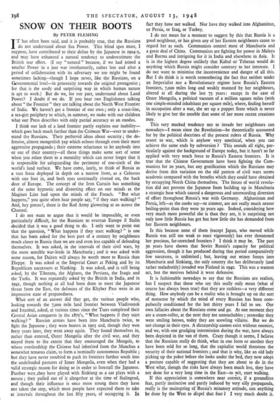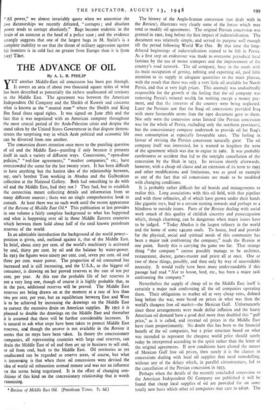SNOW ON THEIR BOOTS
By PETER FLEMING I think our lack of a land frontier partly explains our inability— which goes back much further than the Crimean War—ever to under- stand the Russians. Their perfervid ideas about security ; the de- fensive, almost mongrelish yap which echoes through even their most aggressive propaganda ; their extreme reluctance to let anybody into or out of their country—all these things make some sort of sense when you relate them to a mentality which can never forget that it is responsible for safeguarding the perimeter of one-sixth of the world's land surface. We have come, lately, to think of Russia as a vast force deployed in depth on a narrow front, as a Colossus with one foot in, and both eyes continually riveted on, the back door of Europe. The concept of the Iron Curtain has something of the same hypnotic and distorting effect on our minds as the Maginot Line had upon the minds of the French. "But what happens," you quite often hear people say, "if they start walking?" And, hey presto!, there is the Red Army glowering at us across the Channel.
I do not want to argue that it would be impossible, or even particularly difficult, for the Russians to overrun Europe if Stalin decided that it was a good thing to do. I only want to point out that the question, "What happens if they start walking?" is one that has been asked for the best part of a century by neighbours much closer to Russia than we are and even less capable of defending themselves. It was asked, in the intervals of their civil wars, by the more sensible war-lords in Manchuria ; and it was asked with some reason, for Dairen will always be worth more to Russia than Dieppe. It was asked at the Imperial Court at Peking and by its Republican successors at Nanking. It was asked, and is still being asked, by the Tibetans, the Afghans, the Persians, the Iraqis and the Turks. It was repeatedly asked by the British in India, and in 1941, though nothing at all had been done to meet the Japanese threat from the East, the defences of the Khyber Pass were in an impressive state of preparedness.
What sort of an answer did they get, the various people who, looking towards the 7,000 mile land frontier between Vladivostok and Istanbul, asked, at various times since the Tsars completed their Central Asian conquests in the 1870's, "What happens if they start walking?" Russian armies have been into Manchuria twice, to fight the Japanese ; they were beaten in 1905 and, though they won forty years later, they went away again. They found themselves in, rather than entered, Outer Mongolia after the civil war, and they stayed there to the extent that they encouraged the Mongols, to whose overlordship the Chinese had inherited from the Manchus a somewhat tenuous claim, to form a nominally autonomous Republic ; but they have never troubled to push its frontiers further south into the undefended pastures of Inner Mongolia, even when they had a valid strategic reason for doing so in order to forestall the Japanese. Further west ,they have played with Sinkiang as a cat plays with a mouse ; they pulled out of it altogether at the time of Stalingrad, and though their influence is once more strong there they have not taken the step, which most people have expected them to take at intervals throughout the last fifty years, of occupying it. In
fact they have not walked. Nor have they walked into Afghaniitan, or Persia, or Iraq, or Turkey.
I do not mean for a moment to suggest by this that Russia is a good neighbour, or has given any of her Eastern neighbours cause to regard her as such. Communists control most of Manchuria and a great deal of China. Communists are fighting for power in Malaya and Burma and intriguing for it in India and elsewhere in Asia. It is in the highest degree unlikely that Kabul or Teheran would do anything which Russia might consider contrary to her interests. I do not want to minimise the inconvenience and danger of all this. But I do think it is worth remembering the fact that neither under an Imperialist nor a Revolutionary r6gfine have Russia's Eastern frontiers, 7,000 miles long and weakly manned by her neighbours, altered at all during the last 75 years : except in the case of Outer Mongolia, a political vacuum of a million square miles (with one simple-minded inhabitant per square mile), where, finding herself in occupation after a war, she set up a puppet State which is never likely to give her the trouble that some of her more recent creations may.
This very marked tendency not to invade her neighbours can nowadays—I mean since the Revolution—be theoretically accounted for by the political doctrines of the present rulers of Russia. Why resort to war, which is anyhow very unethical, when you can achieve the same ends by subversion ? This sounds all right, par- ticularly against the background of Europe today, but it hasn't so far applied with very much force to Russia's Eastern frontiers. It is true that the Chinese Government have been fighting the Com- munists for 20 years, but any gratification which the Russians may derive from this variation on the old pattern of civil wars seems academic compared with the benefits which they could have obtained by occupying North China themselves. The forces of world revolu- tion did not prevent the Japanese from building up in Manchuria a strategic base which caused a dangerous and unrewarding diversion of effort throughout Russia's war with Germany. Afghanistan and Persia, left—as the cooks say—to simmer, are not really much nearer boiling-point than they were 30 years ago. Indeed, considering how very much more powerful she is than they are, it is surprising not only how little Russia has got but how little she has demanded from her Eastern neighbours.
Is this because none of them (except Japan, who moved while Russia was still too weak to react vigorously) has ever threatened her precious, far-stretched frontiers ? I think it may be. The past 30 years have shown that Soviet Russia's capacity for political aggression, though it has produced during that period comparatively few successes, is unlimited ; but, leaving out minor forays into Manchuria and Sinkiang, the only country she has deliberately (and rather maladroitly) invaded was Finland in 1940. This was a wanton act, but the motives behind it were defensive.
It is fashionable nowadays to say that the Russians are realists, but I suspect that those who say this really only mean (what of course has always been true) that they are ruthless—a very different thing. How anybody can be a realist who is brought up on the sort of nonsense by which the mind of every Russian has been com- pulsorily conditioned for the last thirty years I fail to see. Our own fallacies about the Russians come and go. At one moment they are a steam-roller, at the next they are untouchables ; yesterday they were smiling heroes, today they are scowling villains. But we do not change in their eyes. A dictatorship cannot exist without enemies, and we, with one grudging intermission during the war, have always been depicted in the van of them. Crazy though it seems, I believe that the Russians really do think, what in one form or another they have been told for so long, that the capitalist world threatens the security of their national frontiers ; and that is why, like an old lady picking up the poker before she looks under the bed, they now adopt a posture capable of suggesting that they are about to do in the West what, though the risks have always been much less, they have not done for a very long time in the East—to wit, start walking.
If this appreciation is somewhere near correct, if a groundless fear, partly instinctive and partly induced by very silly propaganda, really is the mainspring of Russia's minatory attitude, can anything be done by the West to dispel that fear ? I very much doubt it.
"All power," we almost invariably quote when we anatomise the ,two dictatorships we recently defeated, " corrupts ; and absolute power tends to corrupt absolutely." Bugs become endemic in the brain of an autocrat at the head of a police state ; and the evidence strongly suggests that one of the largest bugs in M. Stalin's is a complete inability to see that the threat of military aggression against his frontiers is in cold fact no greater from Europe than it is from (say) Tibet.



































 Previous page
Previous page